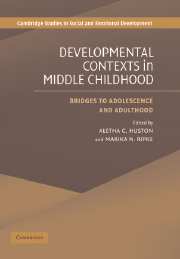Book contents
- Frontmatter
- Contents
- Contributors
- Foreword
- Acknowledgments
- 1 Middle Childhood: Contexts of Development
- 2 The Significance of Middle Childhood Peer Competence for Work and Relationships in Early Adulthood
- 3 Aggression and Insecurity in Late Adolescent Romantic Relationships: Antecedents and Developmental Pathways
- 4 Middle Childhood Family-Contextual and Personal Factors as Predictors of Adult Outcomes
- 5 Genetic and Environmental Influences on Continuity and Change in Reading Achievement in the Colorado Adoption Project
- 6 Reciprocal Effects of Mothers' Depression and Children's Problem Behaviors from Middle Childhood to Early Adolescence
- 7 Middle Childhood Life Course Trajectories: Links Between Family Dysfunction and Children's Behavioral Development
- 8 The Contribution of Middle Childhood Contexts to Adolescent Achievement and Behavior
- 9 Educational Tracking Within and Between Schools: From First Grade Through Middle School and Beyond
- 10 School Environments and the Diverging Pathways of Students Living in Poverty
- 11 The Relations of Classroom Contexts in the Early Elementary Years to Children's Classroom and Social Behavior
- 12 Out-of-School Time Use During Middle Childhood in a Low-Income Sample: Do Combinations of Activities Affect Achievement and Behavior?
- 13 Low-Income Children's Activity Participation as a Predictor of Psychosocial and Academic Outcomes in Middle Childhood and Adolescence
- 14 Healthy Mind, Healthy Habits: The Influence of Activity Involvement in Middle Childhood
- 15 Media Effects in Middle Childhood
- 16 Continuity and Discontinuity in Middle Childhood: Implications for Adult Outcomes in the UK 1970 Birth Cohort
- 17 Mandatory Welfare-to-Work Programs and Preschool-Age Children: Do Impacts Persist into Middle Childhood?
- 18 Effects of Welfare and Employment Policies on Middle-Childhood School Performance: Do They Vary by Race/Ethnicity and, If So, Why?
- 19 Effects of a Family Poverty Intervention Program Last from Middle Childhood to Adolescence
- 20 Experiences in Middle Childhood and Children's Development: A Summary and Integration of Research
- Author Index
- Subject Index
Foreword
Published online by Cambridge University Press: 16 September 2009
- Frontmatter
- Contents
- Contributors
- Foreword
- Acknowledgments
- 1 Middle Childhood: Contexts of Development
- 2 The Significance of Middle Childhood Peer Competence for Work and Relationships in Early Adulthood
- 3 Aggression and Insecurity in Late Adolescent Romantic Relationships: Antecedents and Developmental Pathways
- 4 Middle Childhood Family-Contextual and Personal Factors as Predictors of Adult Outcomes
- 5 Genetic and Environmental Influences on Continuity and Change in Reading Achievement in the Colorado Adoption Project
- 6 Reciprocal Effects of Mothers' Depression and Children's Problem Behaviors from Middle Childhood to Early Adolescence
- 7 Middle Childhood Life Course Trajectories: Links Between Family Dysfunction and Children's Behavioral Development
- 8 The Contribution of Middle Childhood Contexts to Adolescent Achievement and Behavior
- 9 Educational Tracking Within and Between Schools: From First Grade Through Middle School and Beyond
- 10 School Environments and the Diverging Pathways of Students Living in Poverty
- 11 The Relations of Classroom Contexts in the Early Elementary Years to Children's Classroom and Social Behavior
- 12 Out-of-School Time Use During Middle Childhood in a Low-Income Sample: Do Combinations of Activities Affect Achievement and Behavior?
- 13 Low-Income Children's Activity Participation as a Predictor of Psychosocial and Academic Outcomes in Middle Childhood and Adolescence
- 14 Healthy Mind, Healthy Habits: The Influence of Activity Involvement in Middle Childhood
- 15 Media Effects in Middle Childhood
- 16 Continuity and Discontinuity in Middle Childhood: Implications for Adult Outcomes in the UK 1970 Birth Cohort
- 17 Mandatory Welfare-to-Work Programs and Preschool-Age Children: Do Impacts Persist into Middle Childhood?
- 18 Effects of Welfare and Employment Policies on Middle-Childhood School Performance: Do They Vary by Race/Ethnicity and, If So, Why?
- 19 Effects of a Family Poverty Intervention Program Last from Middle Childhood to Adolescence
- 20 Experiences in Middle Childhood and Children's Development: A Summary and Integration of Research
- Author Index
- Subject Index
Summary
In 1994, the MacArthur Foundation invited fourteen scholars to form an interdisciplinary research network. The network's goal was to advance knowledge about middle childhood, the period from roughly age five to twelve. I think it is a fair characterization that, at the outset, none of us in the network saw ourselves as “middle childhood” scholars. Like many researchers interested in child development, we came to the task with backgrounds in early childhood or adolescence. In principle, we all thought middle childhood mattered, but the belief was buttressed more by theory and personal experience (many of us had children in or just leaving the age range) than it was by empirical research.
The MacArthur Network on Successful Pathways Through Middle Childhood functioned for seven years and generated a lot of good work. But it was not until I read the draft chapters for this volume, three years after the Network ended, that I was sure there were definitive data on the question “does middle childhood matter?” Thank goodness, as richly shown in this volume, it does.
Aletha Huston and her former student and current colleague Marika Ripke have done a great service to developmental science by executing the project that became this book. Having been there at the project's outset, but unconflicted by any substantial involvement, I can certify that the effort took clear thinking, countless hours, and all the intellectual and social skills that the chapter authors ascribe to healthy adults.
- Type
- Chapter
- Information
- Developmental Contexts in Middle ChildhoodBridges to Adolescence and Adulthood, pp. xvii - xxPublisher: Cambridge University PressPrint publication year: 2006

